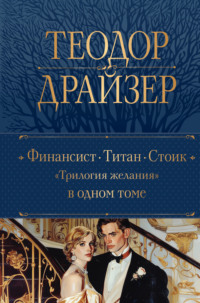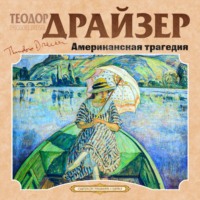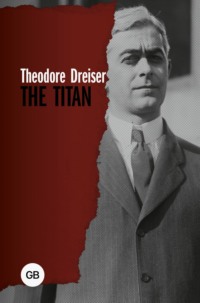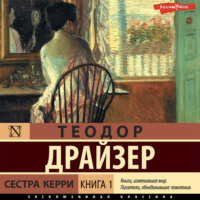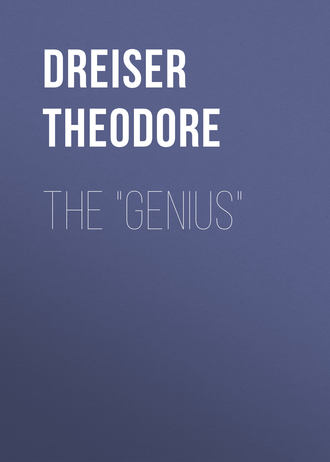 полная версия
полная версияThe "Genius"
It is a question whether the human will, of itself alone, ever has cured or ever can cure any human weakness. Tendencies are subtle things. They are involved in the chemistry of one's being, and those who delve in the mysteries of biology frequently find that curious anomaly, a form of minute animal life born to be the prey of another form of animal life – chemically and physically attracted to its own disaster. Thus, to quote Calkins, "some protozoa are apparently limited to special kinds of food. The 'slipper-animal' (Paramecium) and the 'bell-animal' (Vorticella) live on certain kinds of bacteria, and many others, which live upon smaller protozoa, seem to have a marked affinity for certain kinds. I have watched one of these creatures (Actinobolus) lie perfectly quiet while hundreds of bacteria and smaller kinds of protozoa bumped against it, until a certain variety (Halteria grandinella) came near, when a minute dart, or 'trochocyst,' attached to a relatively long thread, was launched. The victim was invariably hit, and after a short struggle was drawn in and devoured. The results of many experiments indicate that the apparently willful selection in these cases is the inevitable action of definite chemical and physical laws which the individual organism can no more change than it can change the course of gravitation. The killing dart mentioned above is called out by the particular kind of prey with the irresistible attraction of an iron filing for a magnet."
Eugene did not know of these curious biologic experiments at this time, but he suspected that these attractions were deeper than human will. He thought at times that he ought to resist his impulses. At other times he asked himself why. If his treasure was in this and he lost it by resistance, what had he? A sense of personal purity? It did not appeal to him. The respect of his fellow-citizens? He believed that most of his fellow-citizens were whited sepulchres. What good did their hypocritical respect do him? Justice to others? Others were not concerned, or should not be in the natural affinity which might manifest itself between two people. That was for them to settle. Besides, there was very little justice in the world. As for his wife – well, he had given her his word, but he had not done so willingly. Might one swear eternal fealty and abide by it when the very essence of nature was lack of fealty, inconsiderateness, destruction, change? A gloomy Hamlet to be sure, asking "can honor set a leg?" – a subtle Machiavelli believing that might made right, sure that it was a matter of careful planning, not ethics which brought success in this world, and yet one of the poorest planners in it. An anarchistic manifestation of selfishness surely; but his additional plea was that he did not make his own mind, nor his emotions, nor anything else. And worst of all, he counselled himself that he was not seizing anything ruthlessly. He was merely accepting that which was thrust temptingly before him by fate.
Hypnotic spells of this character like contagion and fever have their period of duration, their beginning, climax and end. It is written that love is deathless, but this was not written of the body nor does it concern the fevers of desire. The marriage of true minds to which Shakespeare would admit no impediment is of a different texture and has little sex in it. The friendship of Damon and Pythias was a marriage in the best sense, though it concerned two men. The possibilities of intellectual union between a man and a woman are quite the same. This is deathless in so far as it reflects the spiritual ideals of the universe – not more so. All else is illusion of short duration and vanishes in thin air.
When the time came for Eugene to leave Alexandria as he had originally wanted to do, he was not at all anxious to depart; rather it was an occasion of great suffering for him. He could not see any solution to the problem which confronted him in connection with Frieda's love for him. As a matter of fact, when he thought about it at all he was quite sure that she did not understand or appreciate the nature of her affection for him or his for her. It had no basis in responsibility. It was one of those things born of thin air – sunlight, bright waters, the reflection of a bright room – things which are intangible and insubstantial. Eugene was not one who, if he thought anything at all about it, would persuade a girl to immorality for the mere sake of indulgence. His feelings were invariably compounded of finer things, love of companionship, love of beauty, a variable sense of the consequences which must ensue, not so much to him as to her, though he took himself into consideration. If she were not already experienced and he had no method of protecting her, if he could not take her as his wife or give her the advantages of his presence and financial support, secretly or openly, if he could not keep all their transactions a secret from the world, he was inclined to hesitate. He did not want to do anything rash – as much for her sake as for his. In this case, the fact that he could not marry her, that he could not reasonably run away with her, seeing that he was mentally sick and of uncertain financial condition, the fact that he was surrounded by home conditions which made it of the greatest importance that he should conduct himself circumspectly, weighed greatly with him. Nevertheless a tragedy could easily have resulted here. If Frieda had been of a headstrong, unthinking nature; if Angela had been less watchful, morbid, appealing in her mood; if the family and town conditions had been less weighty; if Eugene had had health and ample means, he would probably have deserted Angela, taken Frieda to some European city – he dreamed of Paris in this connection – and found himself confronted later by an angry father or a growing realization that Frieda's personal charms were not the sum and substance of his existence, or both. George Roth, for all he was a traveling salesman, was a man of considerable determination. He might readily have ended the life of his daughter's betrayer – art reputation or no. He worshiped Frieda as the living image of his dead wife, and at best he would have been heartbroken.
As it was, there was not much chance of this, for Eugene was not rash. He was too philosophic. Conditions might have arisen in which he would have shown the most foolhardy bravado, but not in his present state. There was not sufficient anguish in his own existence to drive him to action. He saw no clear way. So, in June, with Angela he took his departure for Blackwood, pretending, to her, outward indifference as to his departure, but inwardly feeling as though his whole life were coming to nothing.
When he reached Blackwood he was now, naturally, disgusted with the whole atmosphere of it. Frieda was not there. Alexandria, from having been the most wearisome sidepool of aimless inactivity, had suddenly taken on all the characteristics of paradise. The little lakes, the quiet streets, the court house square, his sister's home, Frieda's home, his own home, had been once more invested for him with the radiance of romance – that intangible glory of feeling which can have no existence outside the illusion of love. Frieda's face was everywhere in it, her form, the look of her eyes. He could see nothing there now save the glory of Frieda. It was as though the hard, weary face of a barren landscape were suddenly bathed in the soft effulgence of a midnight moon.
As for Blackwood, it was as lovely as ever but he could not see it. The fact that his attitude had changed toward Angela for the time being made all the difference. He did not really hate her – he told himself that. She was not any different from that she had been, that was perfectly plain. The difference was in him. He really could not be madly in love with two people at once. He had entertained joint affections for Angela and Ruby, and Angela and Christina, but those were not the dominating fevers which this seemed to be. He could not for the time get the face of this girl out of his mind. He was sorry for Angela at moments. Then, because of her insistence on his presence with her – on her being in his company, "following him around" as he put it, he hated her. Dear Heaven! if he could only be free without injuring her. If he could only get loose. Think, at this moment he might be with Frieda walking in the sun somewhere, rowing on the lake at Alexandria, holding her in his arms. He would never forget how she looked the first morning she came into his barn studio at home – how enticing she was the first night he saw her at Sylvia's. What a rotten mess living was, anyhow. And so he sat about in the hammock at the Blue homestead, or swung in a swing that old Jotham had since put up for Marietta's beaux, or dreamed in a chair in the shade of the house, reading. He was dreary and lonely with just one ambition in the world – Frieda.
Meanwhile, as might be expected, his health was not getting any better. Instead of curing himself of those purely carnal expressions of passion which characterized his life with Angela, the latter went on unbroken. One would have thought that his passion for Frieda would have interrupted this, but the presence of Angela, the comparatively enforced contact, her insistence on his attentions, broke down again and again the protecting barrier of distaste. Had he been alone, he would have led a chaste life until some new and available infatuation seized him. As it was there was no refuge either from himself or Angela, and the at times almost nauseating relationship went on and on.
Those of the Blue family, who were in the home or near it, were delighted to see him. The fact that he had achieved such a great success, as the papers had reported, with his first exhibition and had not lost ground with the second – a very interesting letter had come from M. Charles saying that the Paris pictures would be shown in Paris in July – gave them a great estimate of him. Angela was a veritable queen in this home atmosphere; and as for Eugene, he was given the privilege of all geniuses to do as he pleased. On this occasion Eugene was the centre of interest, though he appeared not to be, for his four solid Western brothers-in-law gave no indication that they thought he was unusual. He was not their type – banker, lawyer, grain merchant and real estate dealer – but they felt proud of him just the same. He was different, and at the same time natural, genial, modest, inclined to appear far more interested in their affairs than he really was. He would listen by the hour to the details of their affairs, political, financial, agricultural, social. The world was a curious compost to Eugene and he was always anxious to find out how other people lived. He loved a good story, and while he rarely told one he made a splendid audience for those who did. His eyes would sparkle and his whole face light with the joy of the humor he felt.
Through all this – the attention he was receiving, the welcome he was made to feel, the fact that his art interests were not yet dead (the Paris exhibition being the expiring breath of his original burst of force), he was nevertheless feeling the downward trend of his affairs most keenly. His mind was not right. That was surely true. His money affairs were getting worse, not better, for while he could hope for a few sales yet (the Paris pictures did not sell in New York) he was not certain that this would be the case. This homeward trip had cost him two hundred of his seventeen hundred dollars and there would be additional expenses if he went to Chicago, as he planned in the fall. He could not live a single year on fifteen hundred dollars – scarcely more than six months, and he could not paint or illustrate anything new in his present state. Additional sales of the pictures of the two original exhibitions must be effected in a reasonable length of time or he would find himself in hard straits.
Meanwhile, Angela, who had obtained such a high estimate of his future by her experience in New York and Paris, was beginning to enjoy herself again, for after all, in her judgment, she seemed to be able to manage Eugene very well. He might have had some slight understanding with Frieda Roth – it couldn't have been much or she would have seen it, she thought – but she had managed to break it up. Eugene was cross, naturally, but that was due more to her quarreling than anything else. These storms of feeling on her part – not always premeditated – seemed very essential. Eugene must be made to understand that he was married now; that he could not look upon or run after girls as he had in the old days. She was well aware that he was considerably younger than she was in temperament, inclined to be exceedingly boyish, and this was apt to cause trouble anywhere. But if she watched over him, kept his attention fixed on her, everything would come out all right. And then there were all these other delightful qualities – his looks, his genial manner, his reputation, his talent. What a delightful thing it had become to announce herself as Mrs. Eugene Witla and how those who knew about him sat up. Big people were his friends, artists admired him, common, homely, everyday people thought he was nice and considerate and able and very worth while. He was generally liked everywhere. What more could one want?
Angela knew nothing of his real thoughts, for because of sympathy, a secret sense of injustice toward her on his part, a vigorous, morbid impression of the injustice of life as a whole, a desire to do things in a kindly or at least a secret and not brutal way, he was led to pretend at all times that he really cared for her; to pose as being comfortable and happy; to lay all his moods to his inability to work. Angela, who could not read him clearly, saw nothing of this. He was too subtle for her understanding at times. She was living in a fool's paradise; playing over a sleeping volcano.
He grew no better and by fall began to get the notion that he could do better by living in Chicago. His health would come back to him there perhaps. He was terribly tired of Blackwood. The long tree-shaded lawn was nothing to him now. The little lake, the stream, the fields that he had rejoiced in at first were to a great extent a commonplace. Old Jotham was a perpetual source of delight to him with his kindly, stable, enduring attitude toward things and his interesting comment on life, and Marietta entertained him with her wit, her good nature, her intuitive understanding; but he could not be happy just talking to everyday, normal, stable people, interesting and worthwhile as they might be. The doing of simple things, living a simple life, was just now becoming irritating. He must go to London, Paris – do things. He couldn't loaf this way. It mattered little that he could not work. He must try. This isolation was terrible.
There followed six months spent in Chicago in which he painted not one picture that was satisfactory to him, that was not messed into nothingness by changes and changes and changes. There were then three months in the mountains of Tennessee because someone told him of a wonderfully curative spring in a delightful valley where the spring came as a dream of color and the expense of living was next to nothing. There were four months of summer in southern Kentucky on a ridge where the air was cool, and after that five months on the Gulf of Mexico, at Biloxi, in Mississippi, because some comfortable people in Kentucky and Tennessee told Angela of this delightful winter resort farther South. All this time Eugene's money, the fifteen hundred dollars he had when he left Blackwood, several sums of two hundred, one hundred and fifty and two hundred and fifty, realized from pictures sold in New York and Paris during the fall and winter following his Paris exhibition, and two hundred which had come some months afterward from a fortuitous sale by M. Charles of one of his old New York views, had been largely dissipated. He still had five hundred dollars, but with no pictures being sold and none painted he was in a bad way financially in so far as the future was concerned. He could possibly return to Alexandria with Angela and live cheaply there for another six months, but because of the Frieda incident both he and she objected to it. Angela was afraid of Frieda and was resolved that she would not go there so long as Frieda was in the town, and Eugene was ashamed because of the light a return would throw on his fading art prospects. Blackwood was out of the question to him. They had lived on her parents long enough. If he did not get better he must soon give up this art idea entirely, for he could not live on trying to paint.
He began to think that he was possessed – obsessed of a devil – and that some people were pursued by evil spirits, fated by stars, doomed from their birth to failure or accident. How did the astrologer in New York know that he was to have four years of bad luck? He had seen three of them already. Why did a man who read his palm in Chicago once say that his hand showed two periods of disaster, just as the New York astrologer had and that he was likely to alter the course of his life radically in the middle portion of it? Were there any fixed laws of being? Did any of the so-called naturalistic school of philosophers and scientists whom he had read know anything at all? They were always talking about the fixed laws of the universe – the unalterable laws of chemistry and physics. Why didn't chemistry or physics throw some light on his peculiar physical condition, on the truthful prediction of the astrologer, on the signs and portents which he had come to observe for himself as foretelling trouble or good fortune for himself. If his left eye twitched he had observed of late he was going to have a quarrel with someone – invariably Angela. If he found a penny or any money, he was going to get money; for every notification of a sale of a picture with the accompanying check had been preceded by the discovery of a coin somewhere: once a penny in State Street, Chicago, on a rainy day – M. Charles wrote that a picture had been sold in Paris for two hundred; once a three-cent piece of the old American issue in the dust of a road in Tennessee – M. Charles wrote that one of his old American views had brought one hundred and fifty; once a penny in sands by the Gulf in Biloxi – another notification of a sale. So it went. He found that when doors squeaked, people were apt to get sick in the houses where they were; and a black dog howling in front of a house was a sure sign of death. He had seen this with his own eyes, this sign which his mother had once told him of as having been verified in her experience, in connection with the case of a man who was sick in Biloxi. He was sick, and a dog came running along the street and stopped in front of this place – a black dog – and the man died. Eugene saw this with his own eyes, – that is, the dog and the sick man's death notice. The dog howled at four o'clock in the afternoon and the next morning the man was dead. He saw the crape on the door. Angela mocked at his superstition, but he was convinced. "There are more things in heaven and earth, Horatio, than are dreamt of in your philosophy."
CHAPTER XVI
Eugene was reaching the point where he had no more money and was compelled to think by what process he would continue to make a living in the future. Worry and a hypochondriacal despair had reduced his body to a comparatively gaunt condition. His eyes had a nervous, apprehensive look. He would walk about speculating upon the mysteries of nature, wondering how he was to get out of this, what was to become of him, how soon, if ever, another picture would be sold, when? Angela, from having fancied that his illness was a mere temporary indisposition, had come to feel that he might be seriously affected for some time. He was not sick physically: he could walk and eat and talk vigorously enough, but he could not work and he was worrying, worrying, worrying.
Angela was quite as well aware as Eugene that their finances were in a bad way or threatening to become so, though he said nothing at all about them. He was ashamed to confess at this day, after their very conspicuous beginning in New York, that he was in fear of not doing well. How silly – he with all his ability! Surely he would get over this, and soon.
Angela's economical upbringing and naturally saving instinct stood her in good stead now, for she could market with the greatest care, purchase to the best advantage, make every scrap and penny count. She knew how to make her own clothes, as Eugene had found out when he first visited Blackwood, and was good at designing hats. Although she had thought in New York, when Eugene first began to make money, that now she would indulge in tailor-made garments and the art of an excellent dressmaker, she had never done so. With true frugality she had decided to wait a little while, and then Eugene's health having failed she had not the chance any more. Fearing the possible long duration of this storm she had begun to mend and clean and press and make over whatever seemed to require it. Even when Eugene suggested that she get something new she would not do it. Her consideration for their future – the difficulty he might have in making a living, deterred her.
Eugene noted this, though he said nothing. He was not unaware of the fear that she felt, the patience she exhibited, the sacrifice she made of her own whims and desires to his, and he was not entirely unappreciative. It was becoming very apparent to him that she had no life outside his own – no interests. She was his shadow, his alter ego, his servant, his anything he wanted her to be. "Little Pigtail" was one of his jesting pet names for her because in the West as a boy they had always called anyone who ran errands for others a pigtailer. In playing "one old cat," if one wanted another to chase the struck balls he would say: "You pig-tail for me, Willie, will you?" And Angela was his "little pigtail."
There were no further grounds for jealousy during the time, almost two years, in which they were wandering around together, for the reason that she was always with him, almost his sole companion, and that they did not stay long enough in any one place and under sufficiently free social conditions to permit him to form those intimacies which might have resulted disastrously. Some girls did take his eye – the exceptional in youth and physical perfection were always doing that, but he had no chance or very little of meeting them socially. They were not living with people they knew, were not introduced in the local social worlds, which they visited. Eugene could only look at these maidens whom he chanced to spy from time to time, and wish that he might know them better. It was hard to be tied down to a conventional acceptance of matrimony – to pretend that he was interested in beauty only in a sociological way. He had to do it before Angela though (and all conventional people for that matter), for she objected strenuously to the least interest he might manifest in any particular woman. All his remarks had to be general and guarded in their character. At the least show of feeling or admiration Angela would begin to criticize his choice and to show him wherein his admiration was ill-founded. If he were especially interested she would attempt to tear his latest ideal to pieces. She had no mercy, and he could see plainly enough on what her criticism was based. It made him smile but he said nothing. He even admired her for her heroic efforts to hold her own, though every victory she seemed to win served only to strengthen the bars of his own cage.
It was during this time that he could not help learning and appreciating just how eager, patient and genuine was her regard for his material welfare. To her he was obviously the greatest man in the world, a great painter, a great thinker, a great lover, a great personality every way. It didn't make so much difference to her at this time that he wasn't making any money. He would sometime, surely, and wasn't she getting it all in fame anyhow, now? Why, to be Mrs. Eugene Witla, after what she had seen of him in New York and Paris, what more could she want? Wasn't it all right for her to rake and scrape now, to make her own clothes and hats, save, mend, press and patch? He would come out of all this silly feeling about other women once he became a little older, and then he would be all right. Anyhow he appeared to love her now; and that was something. Because he was lonely, fearsome, uncertain of himself, uncertain of the future, he welcomed these unsparing attentions on her part, and this deceived her. Who else would give them to him, he thought; who else would be so faithful in times like these? He almost came to believe that he could love her again, be faithful to her, if he could keep out of the range of these other enticing personalities. If only he could stamp out this eager desire for other women, their praise and their beauty!


